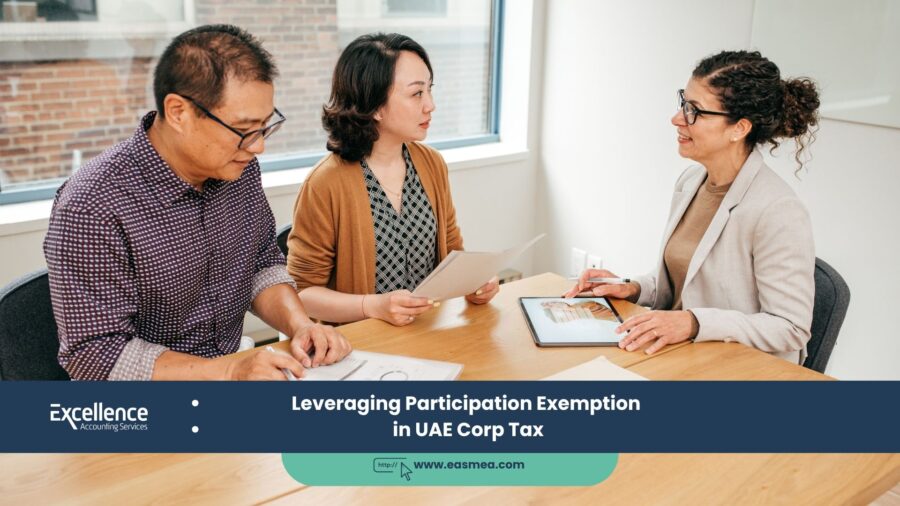Leveraging Participation Exemption in UAE Corp Tax
The UAE Corporate Tax law is a sophisticated piece of legislation, designed not only to generate revenue but also to reinforce the nation’s position as a premier global hub for holding companies and international investment. Perhaps the most powerful tool within this legislation for achieving that goal is the Participation Exemption. This provision is the cornerstone of an efficient corporate group structure, allowing businesses to move profits from subsidiaries to a parent company without incurring multiple layers of taxation.
- Leveraging Participation Exemption in UAE Corp Tax
- Part 1: What is Participation Exemption? The Core Concept
- Part 2: The Four Pillars - Conditions for a "Qualifying Participation"
- Part 3: Strategic Applications for UAE Businesses
- Part 4: Managing Compliance and Documentation
- What Excellence Accounting Services (EAS) Can Offer
- Frequently Asked Questions (FAQs)
- Build a Tax-Efficient Corporate Structure.
At its core, the Participation Exemption allows a UAE parent company to exempt dividends and capital gains received from a qualifying shareholding (a “Participation”). This means profits taxed at the subsidiary level can flow to the shareholder tax-free, preventing the economic double taxation that would otherwise erode value and deter investment. However, this is not an automatic benefit. It is a highly conditional relief that demands careful planning, meticulous documentation, and a deep understanding of the specific criteria laid out in the law. This guide provides a comprehensive analysis of the Participation Exemption, detailing the conditions, strategic uses, and compliance requirements for UAE businesses looking to optimize their corporate structures.
Key Takeaways on Participation Exemption
- Core Purpose: To prevent double taxation on corporate profits by exempting dividends and capital gains from a qualifying shareholding.
- Exempts Two Income Types: It applies to (1) dividends and other profit distributions, and (2) capital gains from the sale of shares.
- Strict Conditions Apply: A UAE shareholder must meet minimum ownership (5%), holding period (12 months), and subsidiary tax status conditions.
- Crucial for Holding Companies: It is the key mechanism that makes the UAE an attractive location for establishing a holding company for regional or global investments.
- Documentation is Paramount: Businesses must be able to prove to the FTA that all conditions for the exemption have been continuously met.
Part 1: What is Participation Exemption? The Core Concept
Imagine a simple corporate structure: a UAE Parent Company owns 100% of a UAE Subsidiary Company. The Subsidiary has a profitable year and pays a 9% Corporate Tax on its taxable income. It then decides to distribute its remaining after-tax profits to the Parent Company as a dividend.
Without a Participation Exemption, this dividend income could be taxed again in the hands of the Parent Company. The same profit would be taxed twice—once at the subsidiary level and again at the parent level. This “double taxation” destroys value and creates a major disincentive for forming corporate groups.
The Participation Exemption solves this problem. As outlined in Article 23 of the UAE Corporate Tax Law, it allows the Parent Company to treat the dividend income from its qualifying subsidiary as exempt income, meaning it is completely excluded from the parent’s taxable income calculation. The same logic applies if the Parent Company sells its shares in the Subsidiary; the capital gain from the sale is also exempt.
Part 2: The Four Pillars – Conditions for a “Qualifying Participation”
The exemption is not automatic. To qualify, the shareholding must meet a stringent set of conditions. A failure to meet even one of these conditions can render the entire exemption invalid for a specific income stream.
Pillar 1: The Ownership Stake Condition (5% or More)
The UAE shareholder (the “Participant”) must own at least 5% of the shares or equity interest in the subsidiary (the “Participation”). This threshold ensures the exemption is targeted at significant, strategic investments, not minor portfolio holdings.
Pillar 2: The Minimum Holding Period (12 Months)
The 5% ownership stake must be held for an uninterrupted period of at least 12 months. This condition is designed to prevent short-term, speculative trading from benefiting from the exemption.
- The exemption can be claimed for dividends received before the 12-month period is complete, provided the shareholder intends to and ultimately does meet the holding period.
- If the shareholder sells the shares before meeting the 12-month period, any previously claimed exemptions on dividends from that shareholding will be clawed back by the FTA.
Pillar 3: The “Subject to Tax” Condition of the Subsidiary
This is often the most complex condition, especially for foreign subsidiaries. The subsidiary must be “subject to” a Corporate Tax or an equivalent tax in its jurisdiction at a rate of at least 9%.
- “Subject to Tax” vs. “Paid Tax”: This test does not mean the subsidiary must have actually paid 9% tax. It could have tax losses or other reliefs that reduce its payable tax to zero. The key is that its profits are, by law, within the scope of a tax system that has a headline rate of at least 9%.
- Foreign Jurisdictions: Proving this for a subsidiary in a foreign country requires careful analysis of that country’s tax laws. This is a critical area for due diligence when acquiring a foreign company.
Pillar 4: The Asset Test (Anti-Abuse Rule)
The exemption will not apply if more than 50% of the subsidiary’s direct and indirect assets consist of ownership interests or shares that would *not* have qualified for the exemption had they been held directly by the UAE shareholder. This is a targeted anti-abuse rule to prevent businesses from routing non-qualifying investments through a holding company just to gain the exemption.
Part 3: Strategic Applications for UAE Businesses
Understanding the conditions is the first step; strategically applying them is what creates value. The Participation Exemption is a powerful tool for corporate structuring and capital management.
The Ideal Holding Company Regime
The exemption makes the UAE an exceptionally attractive location for establishing a holding company to manage regional or global subsidiaries. A UAE holding company can receive profits from its worldwide operations completely tax-free, allowing for the efficient pooling and reinvestment of capital. This is a core focus of strategic company formation advisory.
Tax-Efficient Mergers & Acquisitions (M&A)
When a UAE company acquires a target company, the Participation Exemption is a critical consideration. It ensures that post-acquisition profits can be repatriated to the acquirer without tax leakage. Furthermore, it allows the UAE company to eventually sell or divest the target company without paying capital gains tax on the appreciation in value, provided the conditions are met.
Part 4: Managing Compliance and Documentation
The burden of proof for the Participation Exemption rests entirely on the taxpayer. The FTA is entitled to demand comprehensive evidence that all four conditions were met for the entire holding period for which an exemption is claimed.
Building Your Evidence File
Your compliance file for each participation should include:
- Proof of Ownership: Share certificates, registration documents, and legal agreements proving the 5% stake.
- Proof of Holding Period: Transaction records showing the date of acquisition.
- Proof of “Subject to Tax”: Copies of the subsidiary’s tax returns, assessments from foreign tax authorities, or a formal opinion from a tax advisor in the subsidiary’s jurisdiction confirming its tax status and the applicable rate.
- Financial Statements: Audited financials for both the parent and the subsidiary to verify asset composition and the flow of dividends. An external audit provides the necessary credibility here.
The Role of Technology in Managing Group Structures
For a company with multiple subsidiaries, manually tracking these compliance points is fraught with risk. A sophisticated accounting platform is essential. Using a system like Zoho Books, you can manage inter-company transactions, track dividend payments, and store essential compliance documents in a centralized, auditable manner. Proper financial reporting from such a system is the foundation of your exemption claim.
What Excellence Accounting Services (EAS) Can Offer
Successfully leveraging the Participation Exemption requires expert tax planning and flawless execution. At EAS, we provide strategic guidance to ensure your corporate structure is optimized for tax efficiency and fully compliant with the law.
- Corporate Tax Structuring: We provide expert advice on all aspects of UAE Corporate Tax, helping you design and implement the most effective holding company and group structures.
- M&A Tax Advisory: Our team assists with tax due diligence during acquisitions to ensure target investments will qualify for the Participation Exemption.
- International Tax Planning: We help you navigate the complexities of the “subject to tax” test for your foreign subsidiaries and optimize your global tax position.
- Compliance and Reporting: Our accounting and bookkeeping services ensure you have the robust documentation and financial reporting needed to defend your exemption claims.
Frequently Asked Questions (FAQs)
Yes. The exemption covers both income streams. This includes dividends and other profit distributions received during the holding period, as well as the capital gain realized upon the sale of the shares, provided all conditions are met at the time of the sale.
No. The subsidiary can be a UAE resident company or a foreign company. The same rules apply to both. However, proving the “subject to tax” condition for a foreign subsidiary requires more extensive documentation regarding the foreign tax legislation.
In this case, two things happen. First, the capital gain from the sale of the shares will not be exempt and will be subject to the 9% Corporate Tax. Second, any dividends you received from this shareholding during the 11 months, which you may have already treated as exempt, will be retroactively disqualified. The FTA will require you to amend your previous tax returns and pay the tax on that dividend income.
Yes, most likely. The test is whether it is “subject to” a tax regime with a rate of at least 9%. A tax holiday is a temporary relief from payment, but the company’s profits are still legally within the scope of the 15% tax law. Therefore, it should meet the condition.
Yes. A Qualifying Free Zone Person (QFZP) that earns Qualifying Income at 0% can also have investment income. If a QFZP receives a dividend from a qualifying participation, that income is exempt and does not impact its QFZP status. This allows Free Zone businesses to also act as holding companies.
The ownership stake is based on the equity interest, which typically represents a claim on the profits and net assets of the company. The calculation would need to consider the rights attached to all classes of shares to determine if the shareholder’s interest meets the 5% threshold.
No. An important consequence of the exemption is that any expenses incurred to generate exempt income are not deductible. Therefore, costs directly related to an exempt participation, such as interest on a loan to acquire the shares, would generally be non-deductible.
The rules are designed for investments in entities that are treated as juridical persons for tax purposes. If the subsidiary is a tax-transparent entity (like a partnership), you would typically look through to the underlying business, and the income would be taxed according to its nature, not as a dividend. The exemption would likely not apply directly.
Not necessarily. A company can receive a dividend in month 3 of holding the shares and treat it as exempt, as long as it has a clear intention to hold the shares for at least 12 months and subsequently does so. The compliance is tested over the full period.
A DTAA typically provides relief by offering a foreign tax credit or a reduced withholding tax rate. The Participation Exemption is a domestic law provision that provides a 100% exemption, which is generally more favourable and simpler than claiming a foreign tax credit. Where both are available, the Participation Exemption is usually the preferred route.
Conclusion: A Strategic Imperative for Growth
The Participation Exemption is more than a technical tax rule; it is a powerful strategic enabler. For any UAE business with ambitions of building a corporate group, expanding through acquisitions, or managing international investments, mastering this exemption is not optional—it is a strategic imperative. By understanding the stringent conditions and embracing a proactive approach to compliance and documentation, businesses can unlock the full potential of this provision, ensuring that profits can be redeployed efficiently to fuel further growth and solidify the UAE’s position as their global business nexus.




